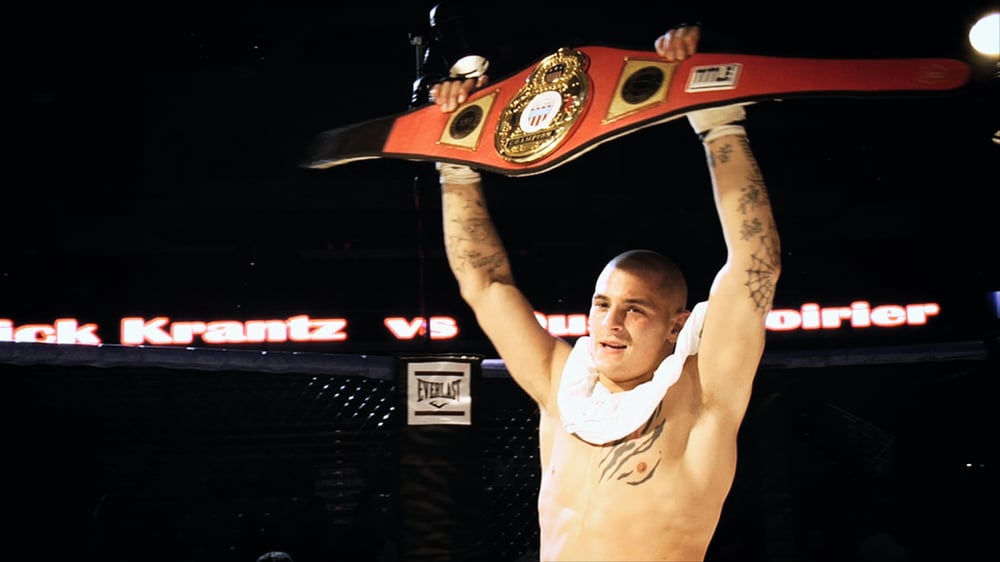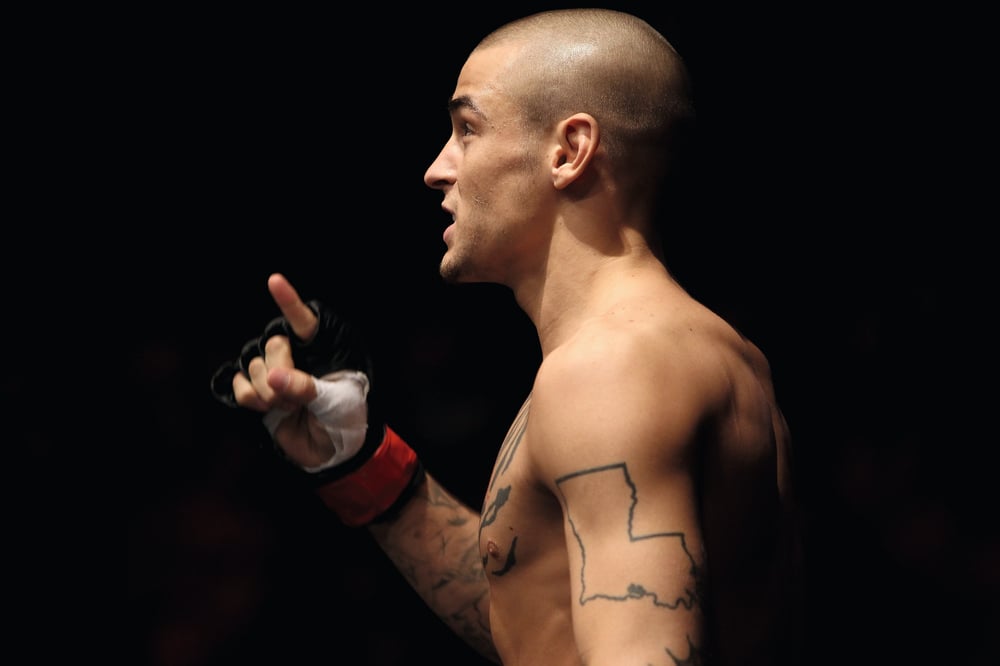
Issue 089
June 2012
After an incredible run of results under the Zuffa banner, is newly polished star Dustin Poirier the most valuable gem in the UFC’s featherweight division?
NEED TO KNOW
Name: Dustin Poirier
Age: 23
Started: 2009
Team: Gladiators Academy
Division: Featherweight
Style: Mixed martial arts
Record: 12-1
Dustin Poirier has the world at his feet, and he knows it. He’s in a position that most 23-year-old mixed martial artists can only dream of. Considering he’s only been fighting since 2009, he’s already one win away from the chance of challenging featherweight king José Aldo for the UFC title, he’s got a sensational 12-1 MMA record and he’s even got a critically acclaimed documentary on its way to the silver screen.
Indeed, the man they call ‘The Diamond’ could easily be excused for believing his own hype. Yet that is anything but the case as, exclusively to Fighters Only, he reveals how a humble upbringing is keeping his feet firmly on the ground, how he developed his burning passion for mixed martial arts, and how the documentary Fightville chronicles his early career and life long before the bright lights of Zuffa’s WEC and UFC spectacles…
You made your UFC debut at UFC 125 against Josh Grispi. Were there any extra nerves going into this fight considering the fact you were a late replacement?
“Of course I was nervous, but I knew I was ready to fight. I wasn’t sitting around waiting for an opportunity to happen. I was in the gym, working, learning and I got the call. I had nothing to lose. I was supposed to lose that fight, so I went there, walked forward and fought the type of fight I knew would break him.
“I feel like I took away some of his steam. I went from 1-1 in the WEC, to fighting on live TV and beating the number-one contender on a couple of weeks’ notice. It was huge and is the biggest win of my career.”
After your fight with Jason Young, you seemed slightly apologetic afterwards. You don’t really see that from fighters, so what happened there?
“It was a really fast-paced exciting fight for the first two rounds and I knew it was close, so in the last round I put him against the cage, tripped him up and grinded out a round.
“I was apologetic because I knew he came to fight. It was his UFC debut and I felt like I smothered him in the third round, which is fighting, and I won the fight. But from one fighter to another I had to let him know that it was a, ‘I’ve got to do what I’ve got to do’ situation.”
You just mentioned you had to grind Jason Young out, but one look at your record shows you are definitely a finisher. How hard is that to do in the UFC?
“The guys in the UFC are hard to finish, man. These guys are trying to feed their family and chase their dreams on the biggest stage in the world for mixed martial arts. There’s no quit in these guys, so you have to finish them, and that’s hard to do when you’re facing the best guys in the world.”

Your next fight is against Chan Sung Jung, which is essentially a title eliminator for a UFC featherweight title shot against José Aldo. However, you’ve previously stated you don’t believe you’re ready for a title shot just yet. Why is that?
“I feel like I don’t want to build myself to get chopped down. I want to fight Aldo when I’m in my prime and when I’m ready for the title. To win a UFC title is the biggest achievement in a fighter’s career, so when I do it I want to be able to hold on to it for a long time.
“Every fight I’m learning a lesson and I’m learning something about myself. However, the UFC have made this a title eliminator and if I go in there and beat Chan Sung Jung unanimously or finish the fight, I’d like to have one more fight after that. Someone like Hatsu Hioki would be good.
“However, if I go in there and get my hand raised on May 15th, and the UFC decide they want me to fight Aldo next, then I’ll be ready for him.”
In the upcoming documentary Fightville, you talk about MMA in a poetic way. What is it about MMA that you love so much?
“When you get into the cage, there are no lies. You can say that you’re training, or say that you’ve been doing this and that, but there’s just no lying when you get in that Octagon. There isn’t anyone who can help you and it doesn’t matter who’s in your corner either. It’s just you.
“I feel like I’m a warrior and if I was born a long time ago, I’d be doing the gladiator thing. I’m lucky to have found my calling, and be able to do it for a living. This is my destiny.”

You also come across in the movie as a guy who was a fighter when you were growing up. What caused you to be that way?
“I think it’s because of where I was raised and the kind of home that I come from. I came from a rough side of town and I didn’t grow up with money or anything like that. My mum raised me, and my dad was only around sometimes. I went to a high school and middle school where I was the minority. My high school was pretty violent too. I was never bullied or anything like that, but I would never back down from a fight.
“Nothing was handed to me. I worked for everything I’ve got and I earned it the hard way, which makes me appreciate everything. People see me and they say I sound so humble, but I’m a realist. I know where I came from and I know what it took for me to get here, but I also know how it easy it can be done and over with. It just means that I appreciate every bit of it.”
Two people who feature prominently in the movie are your mother and Tim Credeur. Your mother seems incredibly supportive, how did she react when you first told her this is what you wanted to do? And how did you and Tim end up training together?
“I wrestled for about two years when I was 11 years old and my mom used to love it. She was motivational and she believed in me every step of the way. My mom loves sports and she wants to see me compete, she wants to see me become the best.
“I started training hard during the IFL days and not too many people were educated and knew what it was, so when I told her I was going to become a cage fighter, she didn’t really know what it was exactly. She thought it was just fighting, but after a couple of fights, she was my number-one fan.
“She understands everything about the sport now, watches fights all the time, orders pay-per-views. In fact, a couple fights ago, she told me I needed to work on my clinch.
“When I met Tim, I’d had about four or five amateur fights and he was doing a seminar at the local jiu-jitsu school I was training at. I went to the seminar and afterwards, I stayed behind and we did some sparring, and we beat the crap out of each other.
“We really beat the hell out of each other and he was like, ‘This kid may have some potential.’ A couple of months later he opened his gym and I don’t know how he got my number, but he called me and said, ‘You’ve got to come to my gym. You have to be part of the gym.’ So that’s what I did.”
Fightville is available to purchase now from video on demand. For info, visit fightville.net.

FIGHTVILLE - THE UNPOLISHED DIAMOND
When were you approached for Fightville, a documentary about MMA, and how did it all come about?
“Fightville was made by a guy called Michael Tucker. He was making a film about war veterans who come back from the war, and one of the guys he was following and filming was an amateur fighter. He was there at the fight, filming, and I just so happened to be on the same card.
“My fight was pretty crazy and I managed to knock the guy out. After that, it sparked an interest in MMA for Michael. He got in touch with the fight promoter who put on the show, who got in touch with us at the gym and everything happened from there.”
By the time you began filming the documentary you were only really known on the regional circuit and you hadn’t arrived in the WEC yet. Were you surprised that Tucker was so interested in you as a fighter?
“Definitely. I was an amateur fighter when he got in contact with me. It took around two years of filming for him to follow me through my amateur career to then all my professional fights on the regional scene. It became this awesome coincidence. He had no idea that I would be in the position I am now.”
How much of the filming do you remember and did it ever get in the way after awhile?
“The cool thing is that it was only Michael who was filming me. There wasn’t a film crew or anything like that. Once I became comfortable around him and we became friends, I didn’t even notice that the camera was in front of me.”
You come across as someone who is very mature for his age, but when you watch the documentary now, do you think you would have done certain things differently?
“When I watched it, I felt the film really captured who I am and showed what I was like as a person and a fighter. What I believe and how I feel about fighting has never changed, but when I look back at some of the training sessions and some of the stuff we were doing, I know that we’ve gotten better since then.
“I’ve evolved as a fighter and every fight camp has gotten better and we’ve rounded off all the rough edges. When I look back at it, I think, ‘Wow, it was crazy cutting weight like that,’ or stuff like that. But I’m living and learning every day so I’m sure when I look back on what I’m doing now, I’ll end up saying the same thing.”










